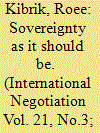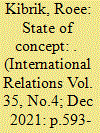| Srl | Item |
| 1 |
ID:
148544


|
|
|
|
|
| Summary/Abstract |
This study suggests that one of the basic elements motivating political actors is their desire to minimize the tension caused by the theoretical gap between their theoretical knowledge and their perception of reality. In order to demonstrate this, the present study compares three different arenas of negotiations which reveal and represent the social construction of the concept of sovereignty: the peace agreement between Israel and Egypt (1979), the peace agreement between Israel and Jordan (1994), and the Oslo agreements between Israel and the PLO (1993–1995). The comparison herein demonstrates how the need to deal with the theoretical gap can explain the sides’ behavior in reaching an agreement. Likewise, the comparison reveals that the concept of sovereignty has destabilized over the course of time. It also shows how political actors in these arenas chose to cope with the theoretical gap – mainly by changing reality – although the destabilization of the concept of sovereignty allowed them to be more creative, theoretically speaking, in the context of globalization processes.
|
|
|
|
|
|
|
|
|
|
|
|
|
|
|
|
| 2 |
ID:
182569


|
|
|
|
|
| Summary/Abstract |
This paper proposes a typology of four possible states of concepts: unquestioned, contested, essentially contested, and destabilized. The typology serves as a frame of reference and as an analytical tool for IR researchers who wish to study concepts and conceptualizing processes as a way of understanding politics. It argues that, within a context, every concept is in one out of four possible states. The typology rests on the relationship between experiences, perceptions, and concepts, aiming to rectify the lacuna of minimal attention to the experiences of many IR works which mainly focus on the inter-subjective sphere and actor-structure tensions. Thus, using the example of sovereignty in Jerusalem during the Israeli-Palestinians negotiations (1993–2001), a new state of concept, the destabilized state, is introduced.
|
|
|
|
|
|
|
|
|
|
|
|
|
|
|
|